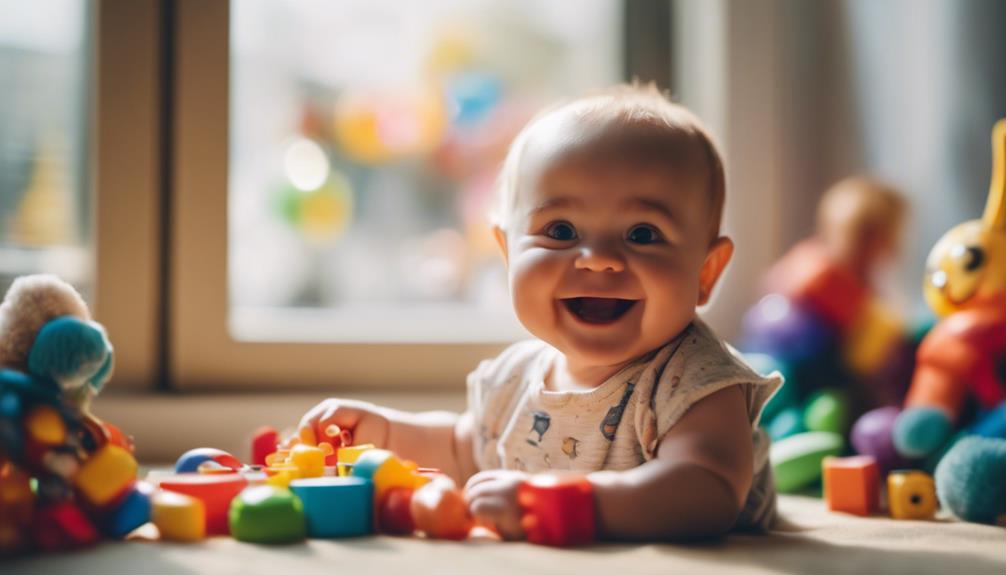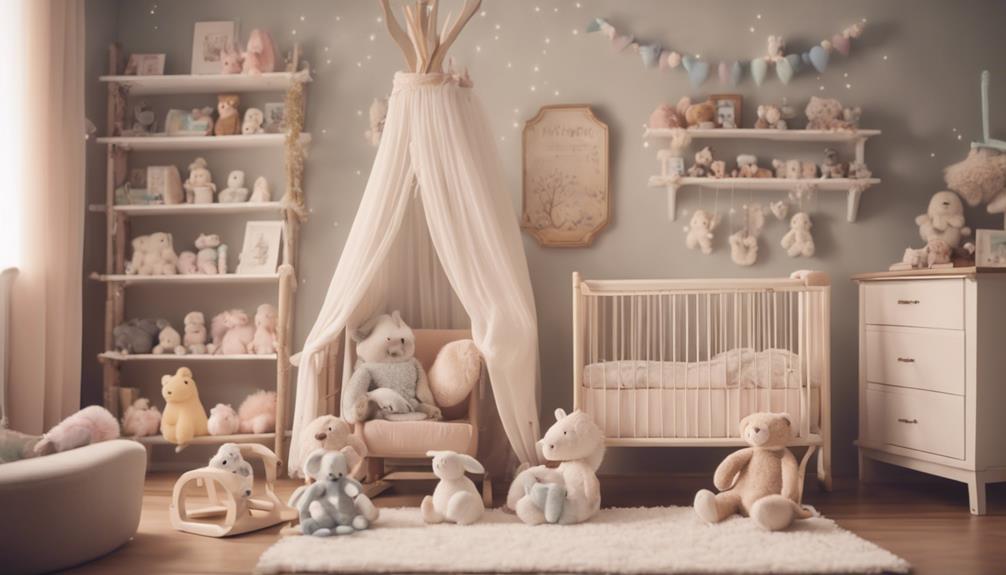Lullabies and gentle tunes play a big role in shaping your baby’s emotions by creating feelings of safety, calming distress, and building trust. Music stimulates parts of the brain responsible for emotional and social growth, helping your little one recognize feelings and develop resilience. Singing familiar songs or choosing soothing melodies fosters emotional bonds and teaches your baby how to express feelings in healthy ways. Keep exploring how music can positively influence your baby’s emotional world.
Key Takeaways
- Lullabies and gentle tunes create a calming environment that reduces crying and promotes emotional security.
- Repetitive melodies foster trust and help babies develop emotional regulation skills.
- Upbeat and lively music evoke joy, excitement, and positive emotional responses.
- Musical interactions serve as safe outlets for babies to explore and express feelings.
- Consistent exposure to nurturing music builds emotional resilience and strengthens emotional bonds.

Have you ever noticed how certain songs instantly lift your spirits or help you relax after a stressful day? Music has a powerful way of influencing our emotions, and this effect starts early in life. When it comes to your baby, music isn’t just entertainment; it’s an essential tool for musical therapy and emotional development. From the gentle lullabies you sing at bedtime to the lively tunes you play during playtime, every sound shapes your little one’s feelings and responses.
Research shows that musical therapy can markedly support your baby’s emotional growth. When you introduce soothing melodies, you help create a sense of security and calmness, which is fundamental for healthy emotional development. Soft, repetitive lullabies can reduce crying and help your baby feel safe, fostering trust and attachment. These moments of musical connection lay the groundwork for your child’s ability to regulate emotions later in life. As you sing or play calming music, you’re not just entertaining your baby—you’re nurturing their ability to process and express feelings effectively.
Music also stimulates your baby’s brain, encouraging neural pathways linked to emotion and social skills. The rhythm, melody, and harmony act as a language that your baby begins to understand even before they can speak. When you sing familiar songs or play gentle tunes, you’re reinforcing emotional bonds and teaching your little one how to respond to different emotional cues. Over time, consistent exposure to music helps your baby recognize patterns and develop emotional resilience. It’s a subtle but powerful way to support their ongoing emotional development, helping them grow into emotionally aware and adaptable individuals.
Furthermore, music provides a safe outlet for your baby to explore and express their emotions. If your little one is frustrated or overwhelmed, playing a soothing song can help them calm down. If they’re happy and excited, lively tunes can amplify their joy. As you participate in these musical moments, you’re modeling emotional expression and communication, which are essential skills for your baby’s social interactions. This active engagement with music encourages your baby to connect feelings with actions, building their emotional intelligence.
Additionally, choosing the right type of music and understanding its emotional impact can further enhance your baby’s emotional well-being and development. This ongoing exposure to nurturing sounds helps your little one build a foundation for emotional understanding and resilience, making music an invaluable part of early childhood growth.
In essence, the music you choose for your baby becomes a foundational part of their emotional landscape. It supports their emotional development by providing comfort, promoting neural growth, and helping them understand their feelings. When you see your baby respond to a song with a smile or a calm breath, you’re witnessing firsthand how music acts as a gentle guide in shaping their emotional world. And the best part? You’re creating meaningful, soothing experiences that will resonate with your little one for years to come.
Frequently Asked Questions
Can Specific Songs Influence a Baby’S Cognitive Development?
You might wonder if specific songs can influence your baby’s cognitive development. Yes, they can! Repeated exposure helps with song memorization, which strengthens memory skills. Additionally, introducing your baby to various tunes encourages musical preference development, fostering early auditory discrimination. By consistently sharing different songs, you support their brain growth and emotional understanding. So, your song choices play a meaningful role in shaping their cognitive and emotional future.
How Does Music Impact a Baby’S Sleep Patterns Long-Term?
Imagine a gentle melody guiding your baby into peaceful slumber—music shapes their sleep patterns long-term. You influence their sleep routine by choosing songs that soothe and comfort, establishing a calming environment. Over time, consistent music preferences can enhance sleep quality, helping your little one develop healthier sleep habits. By making music a part of bedtime, you set the stage for restful nights and happier, more alert days ahead.
Are There Age-Appropriate Music Recommendations for Emotional Growth?
You should choose age-specific tunes that support your baby’s emotional growth and developmental milestones. As your baby reaches different ages, introduce music that aligns with their musical milestones, helping them explore new sounds and rhythms. These age-appropriate choices foster emotional development, boost confidence, and enhance bonding. By selecting suitable music at each stage, you encourage your baby’s ongoing emotional and cognitive growth, making music a valuable tool in their development journey.
What Role Does Parental Music Choice Play in a Baby’s Mood?
Ever wondered how your song selection impacts your baby’s mood? Your parental influence plays a vital role here. When you choose calming lullabies or cheerful tunes, you set a tone that can soothe or energize your little one. Your conscious or subconscious song choices shape their emotional environment, helping them feel secure, happy, or relaxed. So, by selecting the right music, you’re actively nurturing their emotional development.
Can Music Therapy Assist With Babies Experiencing Emotional or Behavioral Issues?
Music therapy benefits your baby by helping improve emotional regulation and addressing behavioral issues. You can participate in sessions that use gentle rhythms and melodies to soothe or stimulate your child, depending on their needs. Through guided activities, your baby learns to express feelings, reduce stress, and develop better emotional understanding. This supportive approach promotes healthier emotional development, making it a valuable tool for managing emotional or behavioral challenges early on.
Conclusion
So, next time you sing a lullaby, remember—you’re not just calming your baby; you’re shaping their entire world! A simple tune can turn tears into giggles and chaos into calm in seconds. Your voice has the power to craft a happier, more confident little human. Don’t underestimate the magic of music—it’s like a superhero cape for your baby’s emotions, capable of transforming their mood faster than you can say “sleepytime.”










